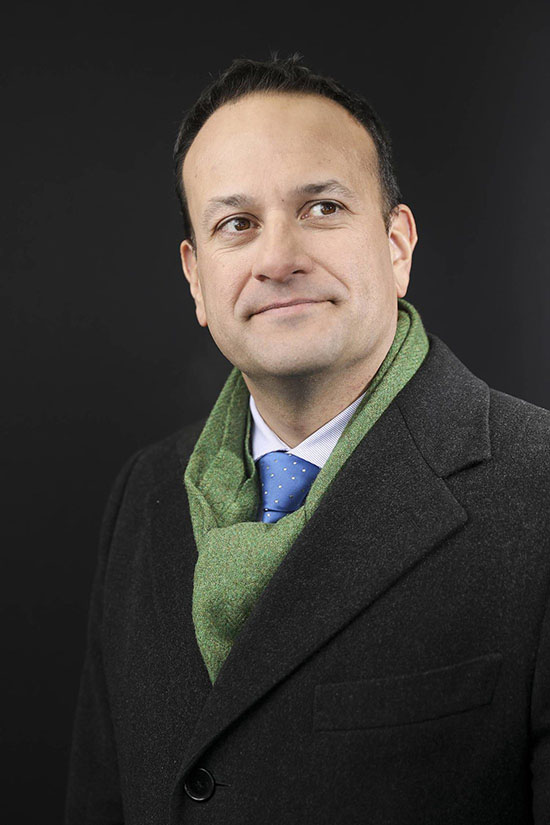英国脱欧,这个国家居然成了最大赢家
|
都柏林城堡1204年就成为爱尔兰的权力中心,在其中一间远离尘嚣的私人会议室里,由助手们陪同的爱尔兰副总理西蒙·科文尼表示,爱尔兰的经济地位毫无疑问,无论英国脱欧与否。他的语调带着节制,和他使用的饱含激情的词汇形成了明显反差。科文尼说:“爱尔兰经济比以往任何时候都更有持续性。”此外,他甚至表示:“我们愿意成为世界上最开放的经济。或许仅次于新加坡。” 他会知道结果的。目前科文尼的职务是爱尔兰副总理、外交部长兼英国脱欧事务首席谈判代表。他说爱尔兰处于“扩张模式”,而且他本人正在监督爱尔兰驻外大使馆和领事馆的大规模修建工作,这正是英国脱欧让国际社会意识到“过度依赖英国”后作出的反应。科文尼还说:“我们推进这些工作的速度也是爱尔兰独立以来未曾出现过的。” |
Cloistered with his aides in a private meeting room of Dublin Castle, the capital’s seat of political power since 1204, Tánaiste Simon Coveney, with a measured tone that betrays the enthusiasm of his words, argues that there’s nothing precarious about Ireland’s economic position, Brexit or otherwise. “The Irish economy is now more sustainable than it’s ever been,” he says. More than that, even: “We like to see ourselves as the most open economy in the world. Maybe [second] after Singapore.” He would know. Coveney—who is at once Ireland’s deputy prime minister, its minister of foreign affairs, and its chief negotiator in Brexit matters—says Ireland is in “expansion mode.” He is overseeing a massive buildup of Irish embassies and consulates that he calls a Brexit-aware response to the global community’s “overreliance on the U.K.,” adding: “We’re doing it at a pace that hasn’t happened since independence.” |

|
目前的使领馆工程包括爱尔兰设在安曼、波哥大、基辅、马尼拉、蒙罗维亚、拉巴特、圣地亚哥和惠灵顿的大使馆,设在卡迪夫、法兰克福、斋浦尔、洛杉矶、孟买、温哥华的领事馆以及东京的泛文化中心,名为爱尔兰之家。2022年就是爱尔兰独立100周年,这里有一种宣示其独立性的意味。 亚洲是西方经济发展的灵丹妙药,而爱尔兰对亚洲的“追求”并非没有回报。去年11月,小米和香港电信运营商Three宣布小米将在都柏林开店,随即推出了一系列新产品。去年,同样在都柏林设有办事机构的华为收购了50个镇的宽带光纤,这是华为和沃达丰合作协议的一部分。去年6月,日本软银披露了作为全球原型在都柏林试运行其“智慧城市”平台的计划。 科文尼对《财富》杂志表示:“这些都和爱尔兰新的信心有关。你可以看到爱尔兰实际上是在循着自己的脚步投资。”当然是前进的最佳足迹,但他的积极支持也带来了问题,那就是世界需要一个欧洲的新加坡吗?甚至是想要一个吗? 爱尔兰政府官员不喜欢人们因为12.5%的企业税率而将爱尔兰称为避税天堂,而且往往会回应说匈牙利的税率只有9%,是欧盟最低水平(英国目前税率为19%,2020年将降至17%。美国独立税收政策非营利组织Tax Foundation的数据表明,欧盟国家的平均企业税率为21.68%)。值得称道的是,到爱尔兰工作的人带来的效益要超过开曼群岛的邮政信箱。但其整体作用是让爱尔兰变得更像欧洲的特拉华州,而不是新加坡。过多的公司总部让这个问题变了味道。 伦敦政治经济学院的经济学家斯瓦蒂·迪格拉认为:“公司搬到都柏林并不会把都柏林变成伦敦。向巴黎、慕尼黑以及其他任何地方的分流都意味着没有哪个城市能继承伦敦曾经拥有的综合实力。” “你也许会得到较大的一块蛋糕,但蛋糕本身会变小。在这方面没有赢家。伦敦正在滑坡,但不会再出现另一个伦敦。” |
The push so far includes Irish embassies in Amman, Bogotá, Kiev, Manila, Monrovia, Rabat, Santiago, and Wellington, as well as consulates in Cardiff, Frankfurt, Jaipur, Los Angeles, Mumbai, Vancouver, and a pan-cultural hub in Tokyo called Ireland House. Buoyed by the imminent centennial of its nationhood, in 2022, there is a sense that Ireland is flexing its independence. Irish courtship of Asia, that Western cure-all for economic development, has not gone unrequited. In November, Chinese electronics company Xiaomi partnered with Hong Kong telecom provider Three to launch a rash of new products following an announcement that Xiaomi would set up shop in Dublin. Last year Huawei, which also has Dublin offices, brought broadband optical fiber to 50 Irish towns as part of a contracted partnership with Vodafone. In June, Japan’s SoftBank revealed plans to pilot its “smart city” platform in Dublin as a global prototype. “It’s all linked to a new confidence in Ireland,” Coveney tells Fortune. “You’re seeing Ireland essentially investing in a footprint.” The best foot forward, surely, yet his boosterism raises questions: Does the world need a European Singapore? Or even want one? Irish government officials dislike when the country is called a tax haven for its 12.5% corporate tax rate and often respond by pointing to Hungary’s 9% rate, the lowest in the EU. (Britain’s is 19% and will drop to 17% in 2020. The average among EU countries is 21.68%, according to the Tax Foundation.) To Ireland’s credit, the workers coming to the country offer more heft than a post office box in the Cayman Islands. But the overall effect has made Ireland more like Europe’s Delaware than its Singapore. Too many headquarters spoil the broth. “Moving companies to Dublin does not turn Dublin into London,” says Swati Dhingra, an economist at the London School of Economics. “The dispersal—to Paris, Munich, wherever—means that nobody will inherit the conglomerate force that London had. You might get a bigger slice of pie, but the pie itself is getting smaller. There are no winners here. London is diminishing, but nowhere is becoming the next London.” |













